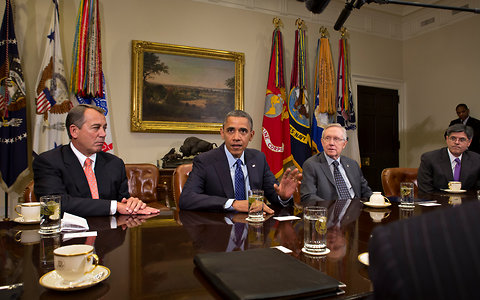
The looming fiscal cliff being furiously debated by economists, politicians, and consumers has a lot to do with the implementation of the Budget Control Act of 2011 which will occur on Jan. 1, 2013. This political policy will essentially result in budget cuts, interest rate increases, tax increases, and more government spending.
Tax rates put forth when George W. Bush was in office will expire, most likely causing higher interest rates for income, capital gains, dividends, and estates. Also, minimum tax breaks for businesses will expire; however, these are often renewed. Taxes will increase for every employed American, and taxes to support Obamacare will most likely impact the wealthy. Budget cuts will also impact government spending.
Why is this fiscal cliff worth mentioning? Why are all these aforementioned changes important?
Many economists predict and fear the looming fiscal cliff and all its consequences could be the start of a global recession. John Nyaradi, publisher of Wall Street Sector Selector, has gone so far as to say, “The fiscal cliff countdown continues, but lost in the noise is a much bigger, more dangerous cliff just ahead: global recession that could extend for years.”
Though this may sound extreme, there are other economic columnists who claim the fiscal cliff will have little to no immediate impact upon the state of the economy. Market Watch columnist Rex Nutting makes the claim, “The U.S. economy will not go over a ‘fiscal cliff’ on Jan. 1, as we’ve been led to believe…The fiscal cliff is a misleading metaphor. The laws will change on that day, it’s true, but the impact will be spread out over many, many months.”
Here at Pace, economics professor Andrew Kliman has a similar opinion as to the impact of the fiscal cliff.
“I don’t think it’s going to be that big of a deal,” said Kliman. “We get this again and again with the president and Congress. It doesn’t matter who the president is. I haven’t talked about it in class because it’s political gameplay more than anything.”
When asked whether or not he believed politics would get in the way of economic recovery, Professor Kliman stated he did not believe so because the fiscal cliff isn’t making much of a difference from what he’s seen in recent indicators, though there may be some current uncertainty among businesses.
Columnist Rex Nutting agrees.
“Businesses, investors, workers, and consumers have begun to prepare for the changes, and that’s caused the economy to slow a bit already,” Nutting writes.
Whether or not the fiscal cliff will have an overwhelming, sudden effect remains to be seen. Should Jan. 2013 show the drastic economic effects of the fiscal cliff, the consequences will doubtlessly touch everyone.

